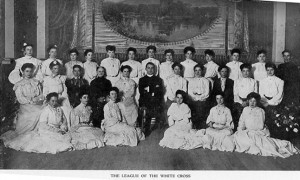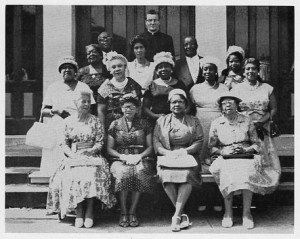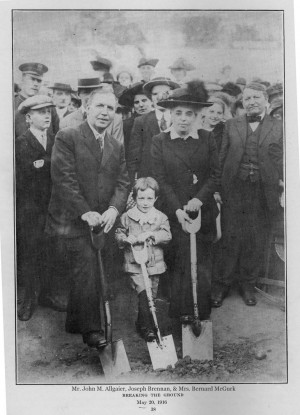Parish History Resources CHRC has several resources that users can access when seeking information on the history of a parish. Resources mostly provide information for those parishes currently located within the Archdiocese of Philadelphia; however, some materials relating to the history of parishes in surrounding dioceses and states are available. Records for parishes that were once part of the Archdiocese of Philadelphia are now held by their respective dioceses. General information about parishes currently located within the Archdiocese, including foundation and closing dates, parish boundaries, and the location of spiritual records for parishes that have closed, can be found on the Archdiocesan website.
The following is a brief discussion of several types of sources available at the Archives.
Parish History Collection
This collection consists of published parish histories as well as other printed material and ephemera relating to a particular parish. The amount and kind of material varies by parish. At this time, complete inventories are available only for parishes in the state of Pennsylvania. Inquiries on parishes outside of Pennsylvania can be made by phone or e-mail. Some material for parishes outside of Pennsylvania may be found in the General Pamphlet Collection which can be searched through our web site. The Parish History Collection and General Pamphlet Collection are accessible through our online catalog.
Parish Calendars
CHRC has a large collection of monthly parish calendars, also known as parish bulletins, for many of the parishes in the current Archdiocese of Philadelphia. There are a limited number of parish calendars for other parts of Pennsylvania and New Jersey. The earliest parish calendars begin in the mid 1890's. The bulk of the collection covers the years 1920-1955, though there may be some parishes with calendars continuing into the early 1960's or even later. There are no complete runs for any parish. The parish calendars contain basic parish information such as times for masses and baptisms, parish societies, parish collection information and school honor roll recipients. They often contain information on parish events, descriptions of church buildings and contributions to church renovations. Early parish calendars often include historical sketches. They also frequently contain information on Catholic doctrine and advice on how to behave as a good Catholic. Advertisements often provide information on the local businesses in the parish. Parish calendars are accessible through CHRC's online catalog.

League of the White Cross (theatrical society), St. Patrick, Philadelphia, circa 1900

St. Mary's Beneficial & Charitable Society, St. Peter Claver, circa 1961
Scrapbook Collection, 1864-1970
This collection contains newspaper clippings of articles relating to the Archdiocese. Scrapbooks covering events after circa 1950 are not as comprehensive as those covering previous years. The period 1921-1927 is also not documented as well as other periods. The collection is arranged chronologically, and includes subject indexes. Notable parish events such as church and school dedications, major renovations and anniversaries are usually documented by articles from both the Catholic newspaper of the time and secular newspapers.
Consultors' Minute Books, 1896-1991
These provide brief descriptions of consultors meetings. The Diocesan consultors are a certain number of priests in each diocese of the United States who act as official advisers of the bishop in certain matters pertaining to the administration of the diocese. Information relating to parishes usually consists of votes on a request to spend money for renovations or new buildings, the establishment of new parishes and setting of parish boundaries. These are only available to researchers through 1940. Requests for access to minutes after 1940 must be made in writing to the CHRC.
Annual Spiritual and Financial Reports, 1897-
The Parish Annual Reports begin in 1897. The spiritual, or pastoral, report contains information on the number of Catholic families and individuals in the parish, school enrollment, sacraments administered and other information on the practice of the faith within the parish. The financial report includes information such as income from weekly and special collections, total yearly expenditures for parish management, mortgages on church buildings and other financial information. In 1953, the spiritual and financial reports were divided and filed separately. The spiritual reports were then filed in the Parish Files. Spiritual reports are available to within 5 years of the current year. Financial reports are available through 1971. Both spiritual and financial reports are open through 1940. Spritual reports after 1940 may be accessed with permission of the pastor. Financial reports after 1940 require permission of the Office for Financial Affairs.
Chancery Parish Files, circa 1920-
These files contain material maintained by the Chancery Office pertaining to the administration of individual parishes. The bulk of the material is copies of letters requesting permission for purchases of property, erection of new buildings, or renovations. Most of this material duplicates information contained in the Consultors' Minute Books. The files also contain Spiritual/Pastoral Reports after 1953. The parish files may also contain copies of articles concerning the parishes, especially if they closed. Parish files after 1930 are closed to researchers except by special permission from the Chancery.
Visual materials
CHRC has numerous images of churches, religious persons, events and places relating to the history of the Archdiocese. Although not comprehensive, researchers can view lists of miscellaneous religious images as well as church images that the Archives has in its collection. Researchers can contact CHRC staff for images that they would like to have researched.
School records
Although CHRC has some administrative materials concerning Archdiocesan schools as well as information regarding the history of some educational institutions, CHRC in general does not have school records. The Archives has some school records, report cards mostly, for three parochial schools: St. Teresa of Avila, St. Peter Claver, and St. Philip Neri. Please contact CHRC staff for more information. Researchers should contact individual parishes or schools for information. Also, if a school or academy was run by a particular religious order, researchers should contact the order's archives for information.

Rectory ground-breaking ceremony, Most Precious Blood, 1916

